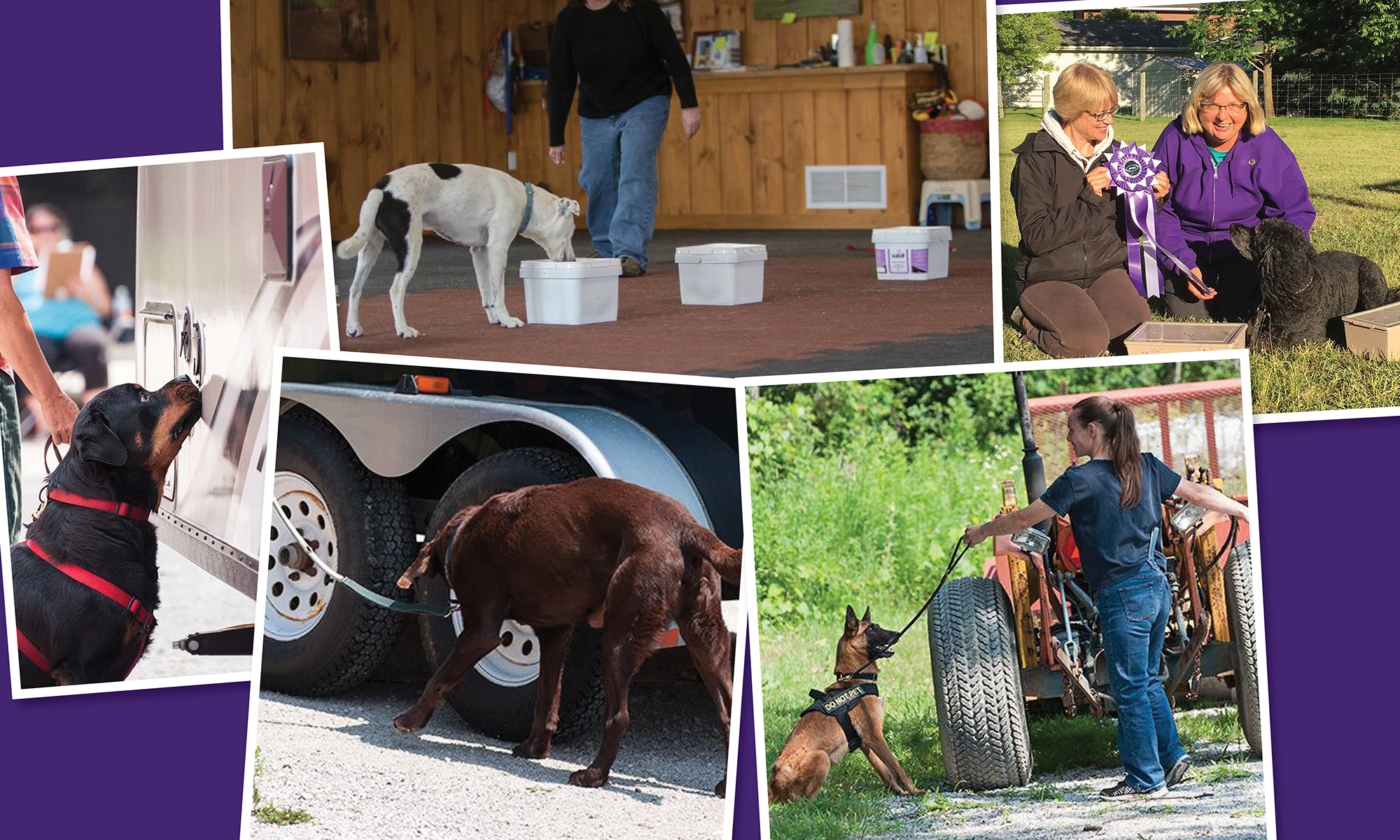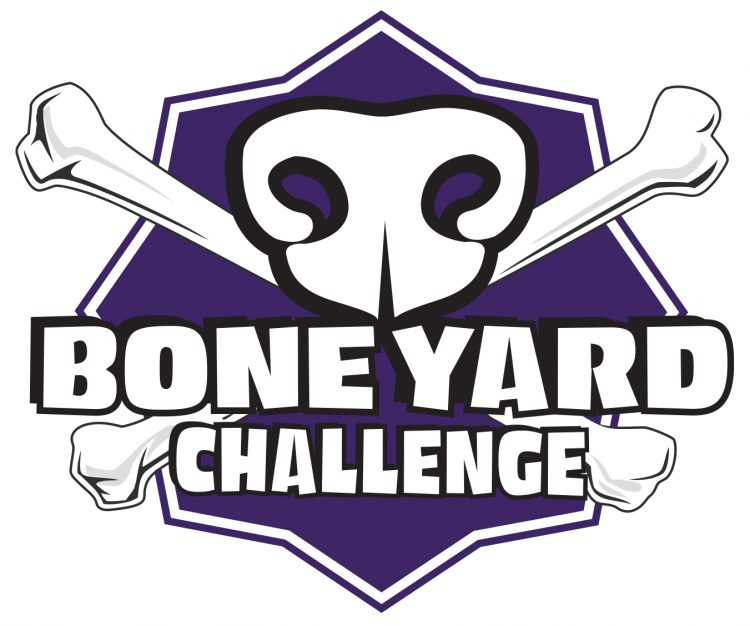SDDA is thrilled to again fund provincial Boneyard competitions in order to provide national-level challenges to all competitors. SDDA will cover all venue and award costs so hosts will not be out of pocket for fixed costs.
SDDA has set parameters for the size and characteristics of the search areas so that searches across the country will be as similar as possible. Also, in order to reduce travel, no official judge is required. An experienced person to set hides and judge and two timers is all that is needed.
For those new to the Boneyard Challenge, it is based on the Boneyard portion of America’s Top Dog competition (from 2020). You can watch the A&E show on YouTube. The detection challenge can be seen here at 2:48 https://www.youtube.com/watch?v=1UTiPJ-A0N0…
or here at 2:52 https://www.youtube.com/watch?v=Ebk1MtxBnXo…
How it Works
The format is that competitors will arrive at a designated time to search 5 rooms in 5 minutes. This ensures that the number of competitors at the venue will be minimal. Each room will have one scented object in it and the teams must identify as many objects that they can in the time allowed. Rooms can be searched in any order. The winning teams will be those that find the most objects in the shortest time.
- Competition will be divided into 3 divisions. Level 1: Untitled/Started; Level 2: Advanced/Excellent and Level 3: Elite or Professional. Competitors may only enter a single dog per level, but can enter a second dog in a level higher than they are titled in. Each dog/handler team may only compete ONCE, regardless of where they enter.
- Each division will have 1st to 3rd placements, with SDDA providing the awards and prize money after the event is completed and results have been submitted. Prize money will be $100 for 1st, $50 for 2nd and $25 for 3rd place.
- Each competitor will be given a time slot to arrive, check in and ask any questions and do their 5-minute search so hosts are encouraged to provide as much information in their welcome letters as possible. There will be NO walk-throughs.
- Scented objects can be anything identifiable and removeable and the difficulty of the location will increase with each level. Scents will be wintergreen for the first level, pine and/or wintergreen for the second level and thyme/pine/wintergreen for the third level.
- Items will be placed by the host or a designated alternative judge who will accompany the team into each area to confirm if they identify the correct item.
- Handlers must identify the object to the judge verbally. For example: “the green purse” or “the soap dish.” The judge will reply with “correct” or “no/incorrect”. Handlers may not touch the items.
- In the case of an incorrect call (a called false alert) the team must leave that room to search the next available room. Once the remaining rooms have been searched, they may return to the room that they missed.
- Dogs may touch or walk on objects but dogs that damage objects or reveal the hide will be excused. They will keep their finds and time to that point.
- The two timers will start their stopwatches at the threshold of the first room and stop the time when the final object is found or call “time” when the time runs out. The official recorded time will be the average of the two times noted.
- NEW! One timer will record the find times for each room, ideally using the timers lap function. In order to break ties, the team with the fastest find of the last-found item will have the higher placement.
- Entry fees will be $50. The host will forward these to SDDA along with the results after the event.
- Once all entry times and results have been received by the SDDA, awards will be mailed by the SDDA. Prize monies will be e-transferred where possible. Cheques will be mailed if e-transfer is not available.
Hosting an Event
Potential hosts should have extensive experience in hosting or judging and/or have titled more than one dog to Excellent or above. Hosts from any province can apply to hold a Challenge if they locate a suitable facility. They can apply for one day or two days if there is enough interest. Events must be held between September 24 and November 13, 2022. Please note that because this is a type of championship, each dog/handler team may only enter ONCE.
SDDA will pay up to $800 per day for the venue and will supply all the awards, score sheets and the scoring spreadsheets. Any additional costs are to be borne by the hosts. These may include stop watches, search items, lunches etc. Hosts can either submit venue receipts after the event or provide an invoice to Stacey@sportingdetectiondogs.ca for venue payment prior to the event. In exchange for hosting the host will receive four free entries (equivalent to $200) that they can use, give away or sell.
We will be accepting applications immediately and will announce events as they are approved. As each event is approved, it will be added to the calendar on the website. Each host is responsible for his/her own entries. Each event day should aim to have a minimum of 25 competitors. Send your hosting applications to karin@sportingdetectiondogs.ca. Please email the following information if you are interested in hosting:
- Host name, phone and email address
- Judge name if different from host
- Venue name and address
- Date of event (you may apply for two days, but each day is a separate event)
- Description of the rooms to be used (eg. Hotel rooms, offices, classrooms etc.). A photo of at least one of the rooms is helpful.
- Estimated number of competitors (per day)
Note: all hosts are expected to follow their provincial and municipal guidelines for Covid19 protocols and municipal bylaws.
Search Areas and Hides
The ideal venue will have at least 5 interior rooms that are very close together. Hosts may book additional rooms for officials to work or rest in and to provide bathroom access for all. They can be adjacent or across from one another but should be quickly and easily accessible to avoid adding too much travel time between searches. Time will NOT be stopped between rooms and teams can move freely between them, except in the case of a called false alert, after which the team must move onto the next room. They may return after all the remaining rooms have been searched.
Rooms must have at least 3 solid walls (down to the floor and at least 5 ft in height) and have at least 15 objects within them that can hold a scent container. Rooms must be at least 200 square feet and furnished (smaller rooms can be combined with hallways or bathrooms). Maximum size is 500 square feet. Larger rooms may have sections blocked off and made inaccessible to comply with size limits. Indoor or outdoor access is acceptable.
Hides are to be placed in removeable objects so that the items can be taken out for subsequent levels. They can be large or small as long as they can be taken from the room for the next level. Hides will increase in difficulty with each level as per the guidelines in the SDDA Rule Book.
Level 1: for Untitled/Started titled dogs: Objects should be well-vented and placed in a readily accessible location below three feet in height. The odour will be Wintergreen. Examples: shoes, tissue boxes, toothbrush holders, chairs, open luggage or purses etc.
Level 2: Advanced/Excellent titled dogs: Objects can be less vented and placed in less accessible locations up to three feet high. The odours will be wintergreen or pine. Examples, closed purses or luggage, coffee makers, phones, books, CD or eyewear cases, etc.
Level 3: Elite and/or MACH titled dogs: Objects can be less vented and placed in difficult to access locations up to four feet high. The odours will be wintergreen, pine or thyme. Examples same as Level 2.
Level 3B: Elite and/or MACH titled dogs handled by the same person as Level 3 above. Since these dogs cannot be leveled up, hosts have the discretion to offer a Group B for this Level as long as they have the ability to change the hides in each room again.
Hosts will likely need a supply of items to be added to rooms where necessary. Items suitable for the type of room are preferred.
Hosts may run unentered test dogs (aka Dog in White) for any level or to clear the rooms prior to use if they wish. Warm-up boxes are not allowed.
Competitor Entry Information
Dogs must be registered with the SDDA. This allows us to confirm title and contact owners in case of any issues. Hosts will be able to check that entries comply with title level but are not responsible for incorrect entries. If a competitor enters the wrong level, their result will be voided by the SDDA.
A dog and handler team may only be entered once in an official Boneyard Challenge and dogs must be entered at the level they have a title in OR above. Handlers may only enter one dog per level at any single event. For competitors with multiple dogs at the same level, you have some options:
- You can level up. That is, you may enter the next level up from your dog’s title (you cannot level down). Eg. If you have an Advanced titled dog and an Excellent titled dog, one dog can be entered at Level 3 (Elite/MACH).
- You can enter another dog on a different day or at a different event if available.
- You can enter another dog with a different handler. A good option for hosts in this circumstance is to schedule these runs back to back.
- For handlers of Elite or MACH titled dogs, if the host makes it available, you may enter both dogs in Level 3. The host will then divide Level 3 into two groups.
Hosts that wish to enter dogs must find an alternate qualified person to judge (at least) the Level they are entered in or they may attend a different event hosted by someone else where possible.
All entries will go through the host who will provide all registration information. Entry fees are set at $50 per dog/handler team. Event dates will be posted on the SDDA website with host contact information.
We will be taking shirt orders again this year once the events have been scheduled. Shirts will be shipped to the event of your choice.
Data Entry
Below is a link to the BYC 2022 Trial Workbook. Entry should be pretty straight forward. As indicated on the sheet, enter the times as:
mm:ss.nn = 2 digit minutes – colon – 2 digit seconds – dot – 2 digit hundredths of a second
Send completed and double, triple checked workbooks to eric@sportingdetectiondogs.ca

